-
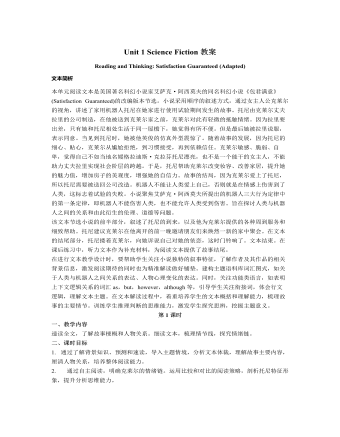
新人教版高中英语选修4Unit 1 Science Fiction教案
本活动旨在落实课时教学目标2。 1.Think, discuss and share. Students form groups of 4, discuss about the given ending make comments. Q1: Do you like the ending? Q2: Was it a logical ending? Why so or why not? [设计意图]通过引导学生思考、讨论、评价,比较个人、同伴所预测的结局和听力文本所给定的结局的异同点,深化对文本的认知,发展学生的评判性思维能力。 Activity 4: Exploring Asimov’s three laws of robotics and the purpose of the writing 本活动旨在落实课时教学目标3。 1. Get to know Isaac Asimov’s three laws of robotics. The teacher shares Isaac Asimov’s three laws of robotics. The three laws state that: ①A robot may not injure a human being or, through inaction, allow a human being to come to harm. ②A robot must obey any orders given to it by human beings, except where such orders would conflict with the First Law. ③A robot must protect its own existence as long as such protection does not conflict with the First or Second Law. Q: How does Tony’s story relate to the laws? 2. Figure out Isaac Asimov’s purpose of writing Satisfaction Guaranteed. The students express their opinions about the author’s writing purpose. Q: Why did Isaac Asimov write such a story? S: To explore the relationship between robots and humans. [设计意图]通过了解艾萨克·阿西莫夫所制定的机器人三大定律,加深学生对文本的理解,深入探究文本的主题意义。推理作者的写作目的,联系生活实际,思考人类与机器人的关系。
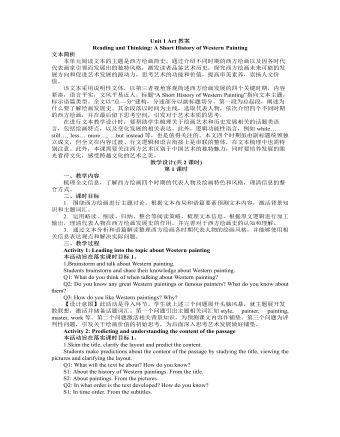
新人教版高中英语选修3Unit 1 Art教案
[2] An important breakthrough…was… [3] Another innovation was … [4] the emphasis increasingly shifted from…to… [5] New ideas and values gradually replaced… [6] While his paintings still had religious themes… … T: All these expressions serve to show how Western painting has developed. Some of them share similar structure but with varied use of words, which makes the text vivid and more readable. 【设计意图】主题类语言整理有助于学生类化语言应用,提高语言输出的丰富性。处理完文本内容信息后,进入语篇信息处理,进行主题相关的词块归类。引导学生快速阅读,寻找表达相同主题(发展或者艺术)的词和短语,再根据词性、用法和结构进行归类,储备主题相关词汇,丰富语言储备,提升语言素养。 Assignment: Go online to gather more information about Chinese painting and write a short history of it. 【设计意图】结合所学,迁移运用,根据实际语境,进行模仿性运用。在此过程中,学生尝试借鉴已学的语言、内容、语篇结构和写作手法来建构新文本,实现语篇输出,同时关注中西艺术文化的差别,加深对优秀文化的认同,培养文化意识。
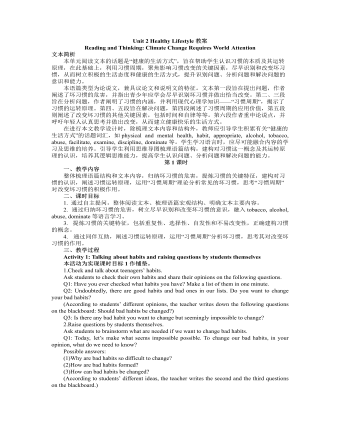
新人教版高中英语选修3Unit 2 Healthy Lifestyle教案
Activity 4: Figuring out the structure and the writing purpose 本活动为实现课时目标2。 1.Read Paragraph 6 and think about its main idea and the writer’s writing purpose. Q1: If you were the author, how would you end your article? “For young people, there is plenty of time to change bad habits. However, there is no “magic pill” or delete button that will help you; you have to think about your bad habits and decide on some changes. You have the power to build a happy and healthy life full of good habits!” Q2: What is Paragraph 6 mainly about? (Possible answer: to appeal to young people including teenagers to change bad habits and live a happy and healthy life.) 2.Think about the writer’s writing purpose and share opinions. Q1: What is the writing purpose? Work in pairs and figure it out. (Possible answer: On the one hand, the passage is written to help teenagers change their bad habits and live a healthy lifestyle. On the other hand, it provides us with a scientific way to identify and analyse our problems objectively, thus strengthening our resolve to tackle the seemingly common yet tough problems in our lives.) 【设计意图】 步骤1旨在预测和验证文章最后一段主要内容,梳理完整的语篇结构,步骤2旨在思考和讨论作者的写作目的。教师也可根据学生课堂反应情况融入对语篇人称多次转换的思考。
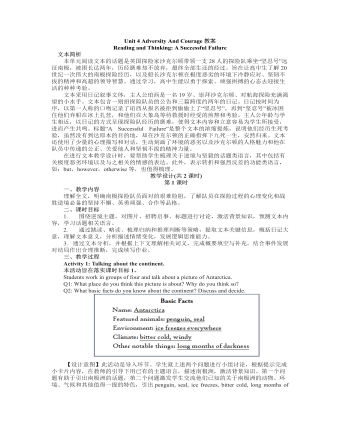
新人教版高中英语选修3Unit 4 Adversity And Courage教案
本活动旨在落实课时目标3。 The Student Union is looking for three students for a 3-week voluntary program in Guizhou province. The volunteers have got to be high school students, with a persevering personality and experiences in overcoming adversity. The volunteers need to stay, eat and teach with 20 pupils in a small school up on the hill of a village. There are no facilities but desks and a blackboard in the school. And there is no take-away food to be bought anywhere; the only way to feed yourself is to cook. You’re interested in applying. Write your application letter introducing what adversity you have ever overcome and how persevering you are as well as what you want to do when at work. Dear Student Union,【设计意图】此任务旨在迁移一、二课时所学,解决实际问题。学生对比自己经历过的挑战或挫折,写信给学生会申请前往贵州担任短期支教教师,把个人以前是怎么战胜挫折的经过书写出来。结合所学,迁移创新,分析解决自身实际问题,在真实情境中学生通过仿写进行主题语言的精确输出。完成任务的过程中,能较多地使用已学语言、内容、结构和写作手法来描述自己面对挫折的处理方式、态度和应有的品质,近一步激发学生树立正确的价值观,学会逆境出人才,坚忍不拔,从容不迫,又做到谦让、分享和合作。课后学生修正习作,再次提交。
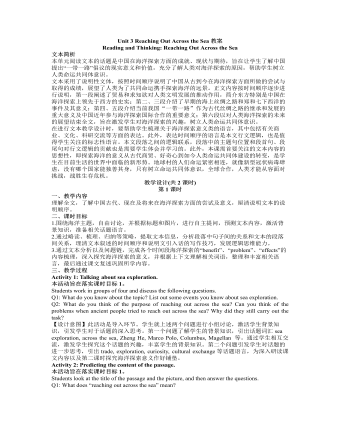
新人教版高中英语选修4Unit 3 Reaching Out Across the Sea教案
本活动旨在落实课时目标3。 Think about the following questions and talk about your own attitude in pairs.Q1: As for this topic,what impresses you the most in the passage?Q2: What do you think of the future of China’s further exploration in sea? Are you in favor of the further exploration?Why or why not? 【设计意图】该活动是一个完全开放性的活动,每个学生都会有不同的答案。运用迁移所学,自由口头表达自己对海洋探索的态度。对于中国海洋探索的未来,每个人的想法是不一样的,有乐观,有担忧,有认为值得投入,也有认为不值得付出太大代价,这里给学生自由表达的空间只要学会有支撑自己观点的事实就可以了,进一步培养学生批判性思维和正确的价值观。 Assignment: 此任务旨在迁移一、二课时所学,培养学生辩证分析问题的能力。 Write about your idea of the future of China’s sea exploration. And add your attitude towards the effort China have made in sea exploration. You’re expected to use the language and the writing technique learnt in the passage.
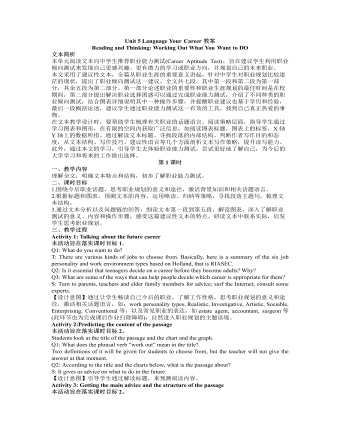
新人教版高中英语选修4Unit 5 Language Your Career教案
本单元阅读文本向中学生推荐职业能力测试(Career Aptitude Test),旨在建议学生利用职业倾向测试来发现自己更感兴趣、更有潜力的学习或职业方向,并规划自己的未来职业。 本文采用了建议性文本,全篇从职业生涯的重要意义讲起,针对中学生对职业规划比较迷茫的现状,提出了职业倾向测试这一建议。全文共七段,其中第一段和第二段为第一部分,其余五段为第二部分。第一部分论述职业的重要性和职业生涯规划的最佳时间是在校期间,第二部分提出解决职业选择困惑可以通过完成职业能力测试,介绍了不同种类的职业倾向测试,结合图表详细说明其中一种操作步骤,并提醒职业建议也基于学历和经验,最后一段概括论述,建议学生通过职业能力测试这一有效的工具,找到自己真正热爱的事物。 在文本教学设计时,要帮助学生梳理有关职业的话题语言。阅读策略层面,指导学生通过学习图表和图形,在有限的空间内获取广泛信息,如阅读图表标题,图表上的标签,X轴Y轴上的数据所指。
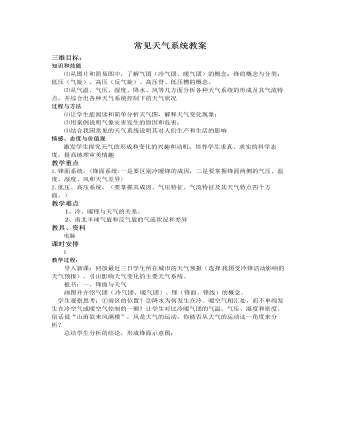
人教版高中地理必修1常见天气系统教案
知识和技能 ⑴从图片和简易图中,了解气团(冷气团、暖气团)的概念;锋的概念与分类;低压(气旋)、高压(反气旋)、高压脊、低压槽的概念。⑵从气温、气压、湿度、降水、风等几方面分析各种天气系统的形成及其气流特点,并综合出各种天气系统控制下的天气状况过程与方法 ⑴让学生能阅读和简单分析天气图,解释天气变化现象;⑵用案例说明气象灾害发生的原因和危害;⑶结合我国常见的天气系统说明其对人们生产和生活的影响情感、态度与价值观激发学生探究天气的形成和变化的兴趣和动机,培养学生求真、求实的科学态度,提高地理审美情趣教学重点1.锋面系统。(锋面系统:一是要区别冷暖锋的成因,二是要掌握锋面两侧的气压、温度、湿度、风和天气差异)2.低压、高压系统。(要掌握其成因、气压特征、气流特征及其天气特点四个方面。)
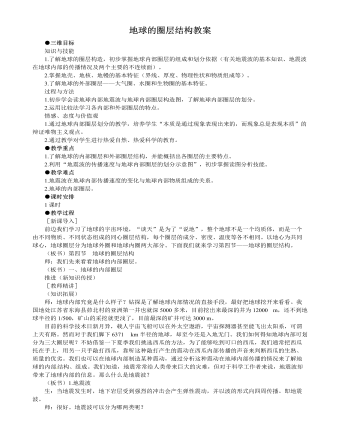
人教版高中地理必修1地球的圈层结构教案
师:很好。由于存在地球大气圈、地球水圈和地表的矿物,在地球上这个合适的温度条件下,形成了适合于生物生存的自然环境。人们通常所说的生物,是指有生命的物体,包括植物、动物和微生物。据估计,现有生存的植物约有40万种,动物约有110多万种,微生物至少有10多万种。据统计,在地质历史上曾生存过的生物约有5亿~10亿种之多,然而,在地球漫长的演化过程中,绝大部分都已经灭绝了。现存的生物生活在岩石圈的上层部分、大气圈的下层部分和水圈的全部,构成了地球上一个独特的圈层,称为生物圈。生物圈是太阳系所有行星中仅在地球上存在的一个独特圈层。课堂小结:地球所有的外部圈层是相互渗透、相互影响,甚至相互重叠的,在太阳和人类生活的参与下,整个地球生机盎然;同时,它们起着保护地球的作用,可以减弱太阳和宇宙辐射对地表的影响,减少宇宙中的陨石对地球表面的撞击。外部各圈中的物质运动和循环,是促使地表物质和形态演变的重要动力。
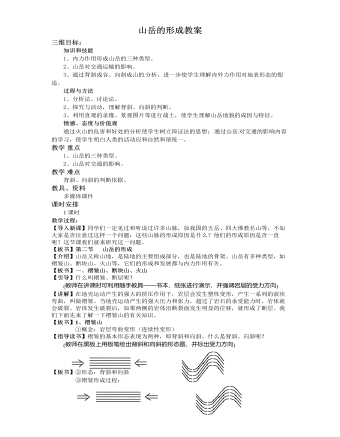
人教版高中地理必修1山岳的形成教案
【转折过渡】除了以上所说的褶皱山和断层山之 外,是否还有其他类型的山脉呢?试举一例说明。【学生思考后回答】有,如富士山属于火山。【教师总结】同学们回答的很好,还有火山,那么火山是如何形成的呢?这就是我们要研究的下一个问题。【板书】3、火山【指导读书】请同学们阅读教材P81思考:①玄武岩高原和火山有什么联系与区别? ②火山由哪几部分构成的?③火山的规模是否相同?【学生回答】①联系:玄武岩高原和火山都是由于处于地下深处的岩浆,在巨大的压力作用下,有时候会沿着地壳的薄弱地带喷出地表而形成的。区别:玄武岩高原是岩浆沿着地壳的线状裂隙流出,往往比较宽广。如哥伦比亚高原。火山是岩浆沿着地壳的中央喷出口或管道喷出。如我国长白山的主峰。②火山由火山口和火山锥两部分组成。③火山的规模大小不一,大火山的相对高度可达4 000~5 000米,火山口直径为数百米;小火山的相对高度不及100米。
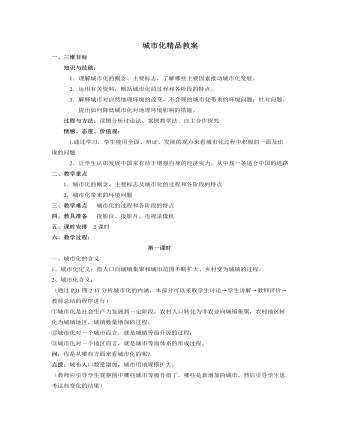
人教版高中地理必修2城市化精品教案
1.改善城市环境:治理河流、控制大气污染物、大力加强绿化建设为改善城市环境,上海市全面展开对大气、河流、噪声等多方面的治理工作。如苏州河的治理、降低城市污染物浓度、加强绿化建设,截止1990年,市区绿化覆盖率达到20.3%。2.改善城市交通、改善居住条件扩宽主干道,修建环城公路,修筑了南浦大桥和扬浦大桥,新修城市高架公路和地铁,改造住宅。3.控制城市规模建立卫星城,开发新区,有效地控制城市中心区的规模。思考:什么时候许多国家采取措施保护和改善城市环境?你认为可以采取哪些措施来保护和改善城市环境?上海市保护和改善城市环境的措施:上海的卫星城有哪些?上海新建了哪个新区?目前浦东新区在上海的地位如何?建立卫星城和开发新区可以起到什么作用?上海市为改善交通条件,做了哪些工作?
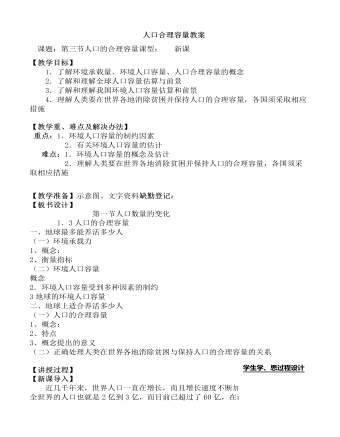
人教版高中地理必修2人口合理容量教案
(1)请同学们结合日常生活实例和教材分析说明人类要在世界各地消除贫困并保持人口的合理容量任务的艰巨性?(2)采取何种措施才能更好的解决这一问题的出现?教师总结(1)现实中的人口问题(如人口过快增长、人口城市化和人口老龄化等)引发了严重的资源问题和环境问题。①发达国家的人均消耗资源量很大,索取资源和转嫁有害生产的地域超出了本国的范围。②发展中国家不仅人口数量多,人均消费水平低,而且一些国家的人口仍在快速增长。若在现有的经济基础上,把发展中国家人均生活质量提高到与发达国家相当的水平,所引发的资源短缺和环境问题将会相当严重,解决的难度也很大。(2)I就整个世界来说:①国际社会要倡导各国,尤其发展中国家要尽最大可能把人口控制在合理的规模之内;②建立公平的秩序,保证大多数人拥有不断追求高水平生活质量的平等权利。
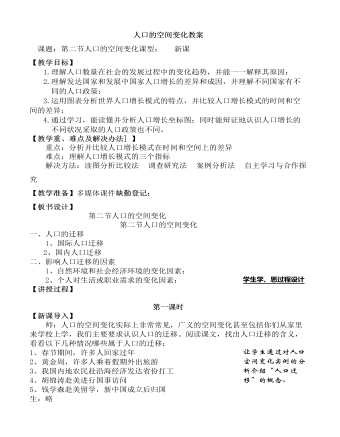
人教版高中地理必修2人口的空间变化教案
影响我国古代人口大规模迁移的因素,与影响我国近几十年人口迁移的因素有何不同?(古代:战乱,其次为开疆拓土、流放、戍边等。现代:国家政策、社会变革、经济发展、个人需求等。)2、为什么有这样的不同?(古代人口迁移受统治者及其行政力量的束缚。由于自给自足的经济十分脆弱,加之频繁的战争以及自然灾害等影响,人民难以安居乐业,不得不背井离乡大批迁移。近几十年来随着社会经济的发展、贸易的往来和交通的便捷,我国人口迁移不仅数量增加,而且频率加快,使各地人们的交往更加密切。)教师总结:从古今中外的人口迁移现象中,我们可以看出在人类历史早期人口迁移中重要的因素是什么?(自然因素)现在什么因素起重要作用?(经济因素)。但是在某种特定的时空条件下,任何一种因素都有可能成为促使人口迁移的决定性因素。【作业设计】查阅49年以来中国历年的人口数据资料,绘制人口增长的统计图表,探究中国人口增长的发展趋势
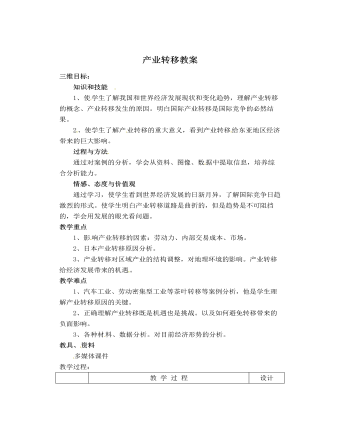
人教版高中地理必修3产业转移教案
1.国家石油价格上涨,导致依赖于国际石油而建立起来的日本重化工业的制造成本提高,产品价格相应提高,削弱了日本重化工产品在国际市场上的竞争力。2.日元 的大幅度升值,意味着日本产品在国际市场上的价格大幅度提高。例如,同样的日本产品,如果原来在国际市场上卖1美元,日元升值1倍后其在国际市场上的售价就达2美元。所以,以国际市场为依托的日本传统产业只好纷纷向海外转移。3.自身市场满足不了发展需求,国际市场上亚洲发展中国家和地区的同类产品具有明显的价格优势。所以,日本企业在其国内发展的空间很小。4.劳动力价格高反映为产品的价格高,而劳动力数量又满足 不了企业进一步扩展对劳动力的需求。所以,日本从事传统产业的国内企业生产受劳动力价格和数量的双重制约。5.促进日本企业生产的区位选择向国土的南、北部和海外扩展。6.“技术立国”的政策明显对传统产业在国内生产不利,即企业生产要么向知识技术密集型转换(这需要大量的投资),要么转向海外。
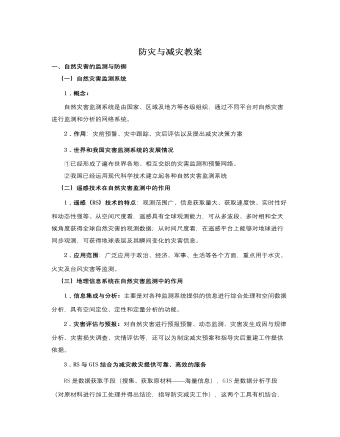
人教版高中地理选修5防灾与减灾教案
(一)自然灾害监测系统1.概念:自然灾害监测系统是由国家、区域及地方等各级组织,通过不同平台对自然灾害进行监测和分析的网络系统。2.作用:灾前预警、灾中跟踪、灾后评估以及提出减灾决策方案3.世界和我国灾害监测系统的发展情况①已经形成了遍布世界各地、相互交织的灾害监测和预警网络。②我国已经运用现代科学技术建立起各种自然灾害监测系统(二)遥感技术在自然灾害监测中的作用1.遥感(RS)技术的特点:观测范围广、信息获取量大、获取速度快、实时性好和动态性强等。从空间尺度看,遥感具有全球观测能力,可从多波段、多时相和全天候角度获得全球自然灾害的观测数据;从时间尺度看,在遥感平台上能够对地球进行同步观测,可获得地球表层及其瞬间变化的灾害信息。
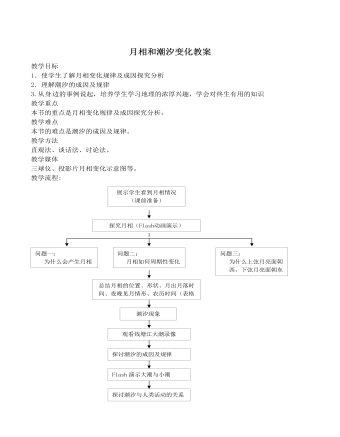
人教版高中地理选修1月相和潮汐变化教案
5.对土星五号火箭和登月舱的质疑现代航天飞机只能把20吨载荷送上低轨,而当 年的土星五号却能轻而易举地把100吨以上载荷送上地球轨道,将几十吨物体推出地球重力圈,为什么后来却弃而不用,据说连图纸都没有保存下来?6.温度对摄影器材的影响月面白天可达到121°C,据图片看,相机是露在宇航服外而没有采用保温措施的。胶卷在66°C就会受热卷曲失效,怎么拍得了照片?这些人士认为,对以上这一切美国政府一直没个 交代,而知情者由于担心生活和安全受到影响,甚至可能直接遭到了胁迫,至今对此沉默不言。但相信不久的将来,诞生于美苏太空竞赛年代的“登月骗局”定会水落石出。反驳不过,也有许多人认为“阿波罗”登月计划不可能造假:首先因为该计划当时是在全球实况转播的,近亿人亲眼看到。另外,宇航员还从月球带回了一些实物,如岩石。

人教版高中地理必修3区域工业化与城市化教案
知识和技能 1、 了解区域工业化和城市化之间的关系,以及它们对区域社会经济发展所起的作用 。2、分析导致珠江三角洲工业化和城市化快速推进的诸多思想束缚,并通过比较,认识到对外开放政策是其中的关键因素。3、 比较珠江三角 洲的 区工业化进程的两个主要阶段,归纳出不同时期的主要发展特点,并能够结合具体案例分析工业化进程对城市化的巨大推动。 4、分析珠江三角洲地区工业化和城市化进程中的问题,并尝试评价目前的一些调整措施和发展方向。5、通过分析我国珠江三角 洲地区工 业化、城市化的发展阶段、问题与对策,了解区域工业化和城市化的推进动力和发展规律。过程与方法 利用扮演不同的社会角色来谈对珠江三角洲地区未来经济和城镇发展的设想和建议,反馈学生知识、能力、价值观发展情况和效果, 培养学生对所学所得的运用能力,并为学生的创新精神的发 展营造有利氛围。情感、态度与价值观1、通过鼓励学生主动获 取资料的做法,关注学生实践能力、综合思维能力及终身学习能力的训练。
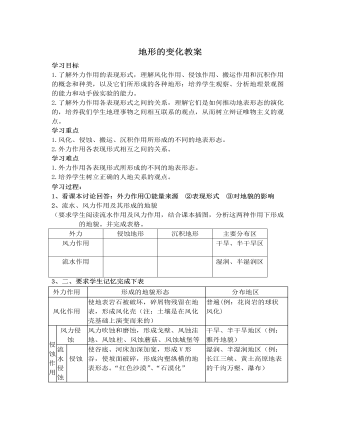
人教版高中地理选修1地形的变化教案
学习目标1.了解外力作用的表现形式,理解风化作用、侵蚀作用、搬运作用和沉积作用的概念和种类,以及它们所形成的各种地形;培养学生观察、分析地理景观图的能力和动手做实验的能力。2.了解外力作用各表现形式之间的关系,理解它们是如何推动地表形态的演化的,培养我们学生地理事物之间相互联系的观点,从而树立辩证唯物主义的观点。学习重点1.风化、侵蚀、搬运、沉积作用所形成的不同的地表形态。2.外力作用各表现形式相互之间的关系。学习难点1.外力作用各表现形式所形成的不同的地表形态。2.培养学生树立正确的人地关系的观点。学习过程:1、看课本讨论回答:外力作用①能量来源 ②表现形式 ③对地貌的影响2、流水、风力作用及其形成的地貌
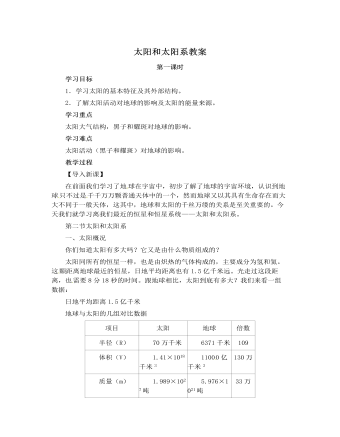
人教版高中地理选修1太阳和太阳系教案
彗星简介:(1)云雾状的独特外貌,质量很小;(2)主要由冰物质构成(含尘埃、水、甲烷、二氧化碳等),有人称它为“脏雪球”;(3)结构分彗核、彗发、彗尾(分离子尾、尘埃尾),彗星在远离太阳时,只有一个冰冻的彗核,当行进太阳时,组成物质升华而形成彗发,在太阳风的吹拂下,背向太阳的一侧出现彗尾,远离太阳时,彗尾消失,尾永远背向太阳;(4)目前已经 发现了1600多颗彗星,最著名的就是哈雷彗星,1985~1986 年,曾回归;(5)彗星的公转周期各不相同,相差极大,有的几十年,有的几百年,哈雷彗星的公转周期为76年。学生讨论回答,然后速读课文“流星体”。【启发引导】行星际空间是否是“真空”状态?行星际空间分布着极其稀薄的气体和尘埃,称为行星际物质,行星际物质的来源——太阳风、星际冲撞……
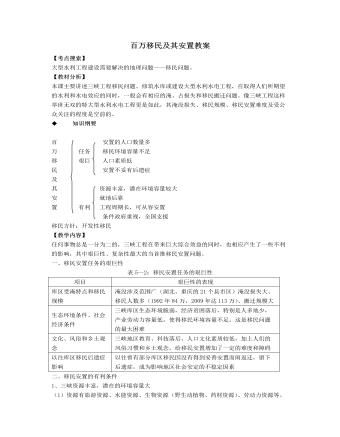
人教版高中地理选修2百万移民及其安置教案
三峡库区农村移民安置根本出路是通过发展大农业来解决耕地不足,不应盲目开垦荒坡地,防止产生新的水土流失,尽量避免生态环境恶化。2、就地后靠,就近安置模式三峡库区淹没区线状分布的受淹特点有别于一般水库淹没区的片状分布,使得库区移民具有相对分散的特点,且淹没涉及的356个乡镇没有一个被全淹,甚至全淹的村也很少,这有利于移民在本县甚至本乡就近后靠安置,避免了水库移民大量外迁、远迁所造成的种种困难和后遗症。三峡移民搬迁大多可以就地后靠,就近安置,这是三峡移民的一大特色。就近后靠安置的优点是不离本乡本土,移民容易接受,且避免了移民大量外迁、远迁所造成的困难和后遗症;缺点是容易对当地的生态环境造成过大的压力,如过度开垦坡地、破坏植被、加剧水土流失等。3、工程周期长,可从容安置移民三峡工程建设周期长(1994年~2009年,共17年),使得移民安置能够及早进行,可以从容安置移民的生产和生活。
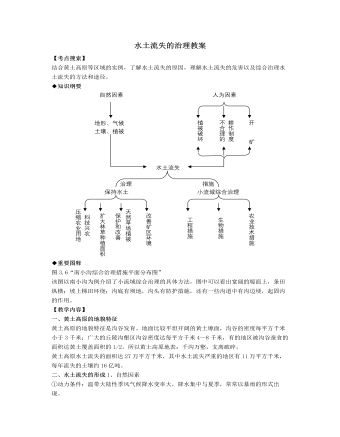
人教版高中地理选修2水土流失的治理教案
2、关于黄土高原小流域及其治理的叙述,正确的是()A.小流域不能看作是一个完整的地域单元B.小流域可以相当于黄土高原上一条河流的整个流域C.小流域综合治理的方针是“保塬、护坡、固沟“D.小流域的综合治理只能采用农业技术措施3、黄土高原植被遭到破坏的原因有()①营造宫殿,毁林开荒②修筑梯田,开石动土③开荒弃荒,轮荒作业④开露天矿,建隔离护坝⑤保塬护坡,打坝建库⑥开挖原生地面,复垦采空矿区A.①②④B.①③⑤C.①③D.②④4、下列关于黄土高原的叙述,正确的是()A.水土流失不可治理B.人为因素是黄土高原现代水土流失的主导因素C.植树种草是做好水土保持的基本前提D.开矿会加剧水土流失,故应少开矿5、引起黄土高原水土流失最直接的因素是()A.降水集中于夏季且多暴雨B.黄土垂直节理发育C.地表崎岖不平,千沟万壑D.不合理开发造成地表黄土裸露,失去植被保护6、治理黄土高原水土流失的工程措施有()A.植树造林B.平整土地C.修建水库D.深耕改土

